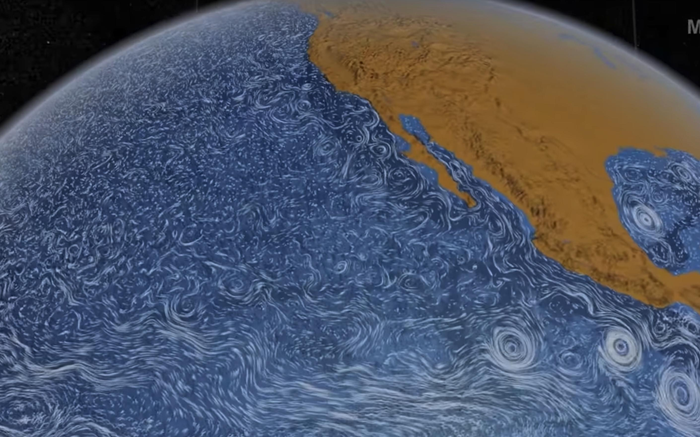An international team led by researchers at Scripps Institution of Oceanography at UC San Diego used computer model simulations to find that climate change is altering the mechanics of surface ocean circulations, making them become faster and thinner.

Credit: NASA
An international team led by researchers at Scripps Institution of Oceanography at UC San Diego used computer model simulations to find that climate change is altering the mechanics of surface ocean circulations, making them become faster and thinner.
These changes can have a ripple effect in the ocean, affecting the transport of the nutrients organisms need as well as that of microorganisms themselves. Swifter currents may also affect the processes by which the ocean removes carbon and heat from the atmosphere and protects the planet from excessive atmospheric warming.
“We were surprised to see that surface currents speed up in more than three-fourths of the world’s oceans when we heated the ocean surface,” said study lead author Qihua Peng, who recently joined Scripps Oceanography as a postdoctoral researcher.
The study, published April 20 in the journal Science Advances, sheds light on an underappreciated force behind the speed of global ocean currents. It helps resolve a debate on whether currents are accelerating as a result of global warming.
Wind has been the main factor scientists have studied to describe and predict the speed of currents, but the research team used a global ocean model to simulate what happens when sea surface temperatures are also increased. They found that warming makes the topmost layers of water become lighter. The increased density difference of those warm surface layers from the cold water beneath limits the swift ocean currents to a thinner layer, causing the surface currents to speed up in more than three-fourths of the world’s oceans. The increased speed of rotating ocean currents known as gyres was associated with a slowdown of ocean circulation underneath. The team directly correlated the trend to the presence of ever-increasing levels of greenhouse gases in the atmosphere.
“Our study points to a way forward for investigating ocean circulation change and evaluatingthe uncertainty,” said Scripps Oceanography climate modeler Shang-Ping Xie, whose portion of the work is funded by the National Science Foundation.
Currents are organized into gyres in most oceans that are bounded by continents. The Southern Ocean that rings Antarctica is an exception. There, howling westerly winds make the Antarctic Circumpolar Current the largest in the world in terms of volume transport. Last year, Scripps scientists detected from ocean and space observations that the Antarctic Circumpolar Current is speeding up.
“The accelerating Antarctic Circumpolar Current is exactly what our model predicts as climate warms,” said Xie.
Study co-authors include Dongxiao Wang of Sun Yat-Sen University in China, scientists from the Chinese Academy of Sciences, Woods Hole Oceanographic Institution in Massachusetts, and UC Riverside.
Journal
Science Advances
Method of Research
Computational simulation/modeling
Subject of Research
Not applicable
Article Title
Surface warming-induced global acceleration of upper ocean currents
Article Publication Date
20-Apr-2022
COI Statement
The authors declare they have no competing interests.




